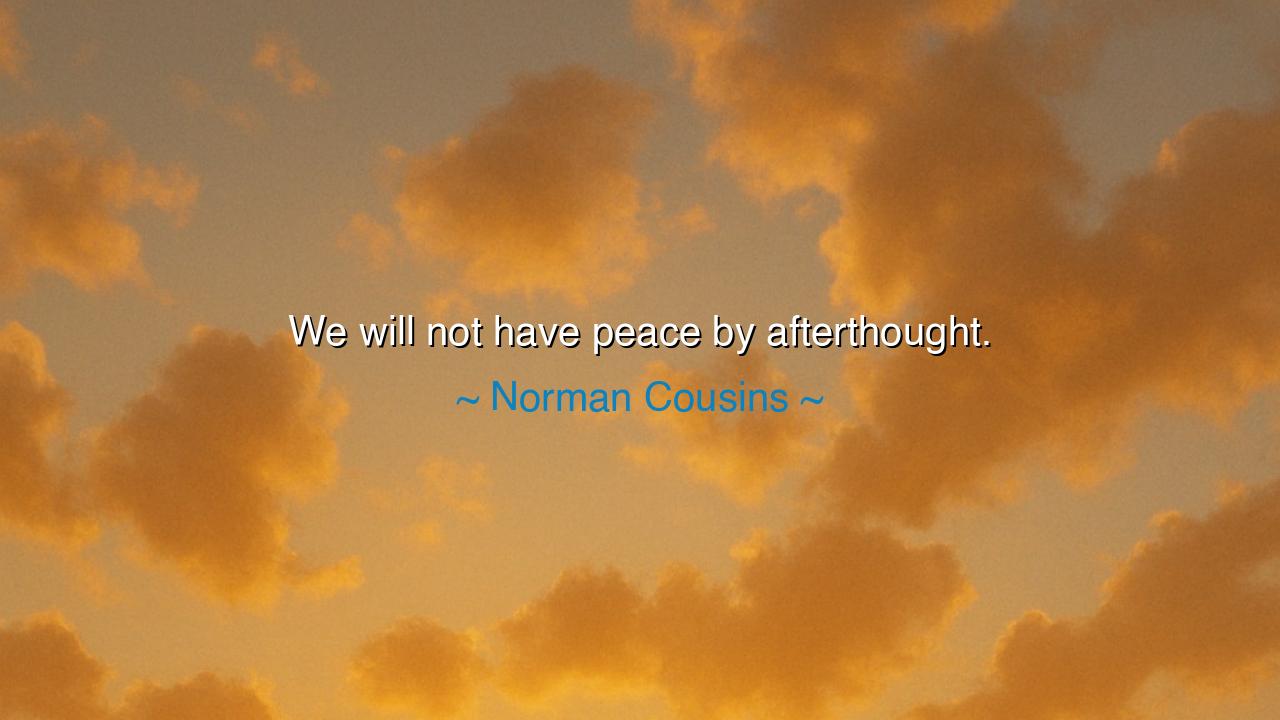
We will not have peace by afterthought.






Norman Cousins, a man who lived through the storms of the twentieth century and lifted his voice for humanity’s survival, once proclaimed: “We will not have peace by afterthought.” In this short sentence lies the force of a great truth: that peace cannot be an accident, nor the fruit of neglect, nor a thing grasped at hurriedly after violence has already had its way. Peace must be forged with intention, built with foresight, guarded with vigilance. To leave it as an afterthought is to leave it unrealized, for what is not planted deliberately cannot bear harvest.
The origin of Cousins’ words is found in the shadow of the nuclear age. As editor of the Saturday Review and an advocate for disarmament, he saw the world trembling on the edge of annihilation. He understood that peace could not be postponed until after the engines of war were set in motion. The arms race, the clash of nations, the reckless gamble of destruction—these could not be halted by regret after the fact. Only deliberate action, only careful planning, only the will to choose harmony before catastrophe could give the world a chance to survive. His quote is the distillation of that vision: peace must be first thought, not afterthought.
History bears witness to the cost of neglecting this wisdom. After the First World War, leaders proclaimed peace, but they did so as an afterthought—punishing the defeated with bitterness, building treaties on resentment rather than reconciliation. The result was not lasting peace but the seedbed of another, even greater war. Contrast this with the aftermath of the Second World War, when the victors, wiser now, laid down structures like the United Nations and the Marshall Plan. By thinking of peace beforehand, they prevented another immediate descent into global war. The difference between afterthought and forethought was the difference between tragedy and hope.
Cousins’ words also extend beyond the arena of nations into the daily lives of men and women. How often do we speak of peace only after conflict has scarred our families, our friendships, our communities? We patch wounds when they might have been prevented. We offer apologies after the hurt is done, when wisdom could have guided our tongues and stayed our hands beforehand. In such moments, his words remind us: peace must be chosen early, nurtured daily, and protected before harm is done.
There is also a warning in his statement. To treat peace as an afterthought is to worship the idol of convenience. It is to imagine that violence can be indulged in today, and peace gathered tomorrow. But history and human nature alike prove otherwise: violence creates cycles that echo through generations. To wait until the smoke clears is to find that peace has already slipped beyond reach. Only by sowing understanding, compassion, and justice in advance can peace stand firm against the winds of hatred.
The lesson, then, is both simple and stern: if we desire peace, we must think of it first, act upon it first, and honor it before conflict arises. This means teaching it to our children, weaving it into our politics, shaping it into our communities. It means investing in dialogue before divisions widen, in fairness before resentment festers, in love before bitterness grows. Peace is the fruit of foresight, not the consolation prize of war.
In practice, this calls us to vigilance in our own lives. Seek reconciliation quickly, before anger hardens into enmity. Foster kindness in daily acts, so that bitterness has no soil in which to root. In the public sphere, demand of leaders not only that they stop wars, but that they prevent them—through diplomacy, through justice, through the deliberate cultivation of understanding among peoples. For if peace is not the first goal, it will not survive as the last.
Thus Cousins’ words endure as a timeless commandment: “We will not have peace by afterthought.” Let us etch them into our minds as both warning and guide. For peace, like any great work, must be imagined, designed, and built with care. It is not the shadow left after conflict; it is the light that must be carried before it. And only those who choose peace deliberately will leave behind a world where future generations may dwell in safety and harmony.






AAdministratorAdministrator
Welcome, honored guests. Please leave a comment, we will respond soon